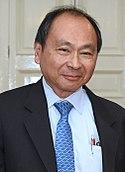Francis Fukuyama Quote
The United States is trapped in a bad equilibrium. Because Americans historically distrust the government, they typically aren’t willing to delegate to the government authority to make decisions in the manner of other democratic societies. Instead, Congress mandates complex rules that reduce the government’s autonomy and make decisions slow and expensive. The government then doesn’t perform well, which confirms people’s original distrust. Under these circumstances, they are reluctant to pay higher taxes, which they feel the government will waste. But while resources are not the only, or even the main, source of government inefficiency, without them the government won’t function properly. Hence distrust of government becomes a self-fulfilling prophecy.
The United States is trapped in a bad equilibrium. Because Americans historically distrust the government, they typically aren’t willing to delegate to the government authority to make decisions in the manner of other democratic societies. Instead, Congress mandates complex rules that reduce the government’s autonomy and make decisions slow and expensive. The government then doesn’t perform well, which confirms people’s original distrust. Under these circumstances, they are reluctant to pay higher taxes, which they feel the government will waste. But while resources are not the only, or even the main, source of government inefficiency, without them the government won’t function properly. Hence distrust of government becomes a self-fulfilling prophecy.
Related Quotes
About Francis Fukuyama
Fukuyama is best known for his book The End of History and the Last Man (1992), which argues that the worldwide spread of liberal democracies and free-market capitalism of the West and its lifestyle may signal the end point of humanity's sociocultural evolution and political struggle and become the final form of human government, an assessment met with numerous and substantial criticisms. In his subsequent book Trust: Social Virtues and Creation of Prosperity (1995), he modified his earlier position to acknowledge that culture cannot be cleanly separated from economics. Fukuyama is also associated with the rise of the neoconservative movement, from which he has since distanced himself.
Fukuyama has been a senior fellow at the Freeman Spogli Institute for International Studies since July 2010 and the Mosbacher Director of the Center on Democracy, Development and the Rule of Law at Stanford University. In August 2019, he was named director of the Ford Dorsey Master's in International Policy at Stanford.
Before that, he served as a professor and director of the International Development program at the School of Advanced International Studies of Johns Hopkins University. Previously, he was Omer L. and Nancy Hirst Professor of Public Policy at the School of Public Policy at George Mason University.
He is a council member of the International Forum for Democratic Studies founded by the National Endowment for Democracy and was a member of the Political Science Department of the RAND Corporation. He is also one of the 25 leading figures on the Information and Democracy Commission launched by Reporters Without Borders. In 2024 he received the Riggs Award for Lifetime Achievement in International and Comparative Public Administration.
